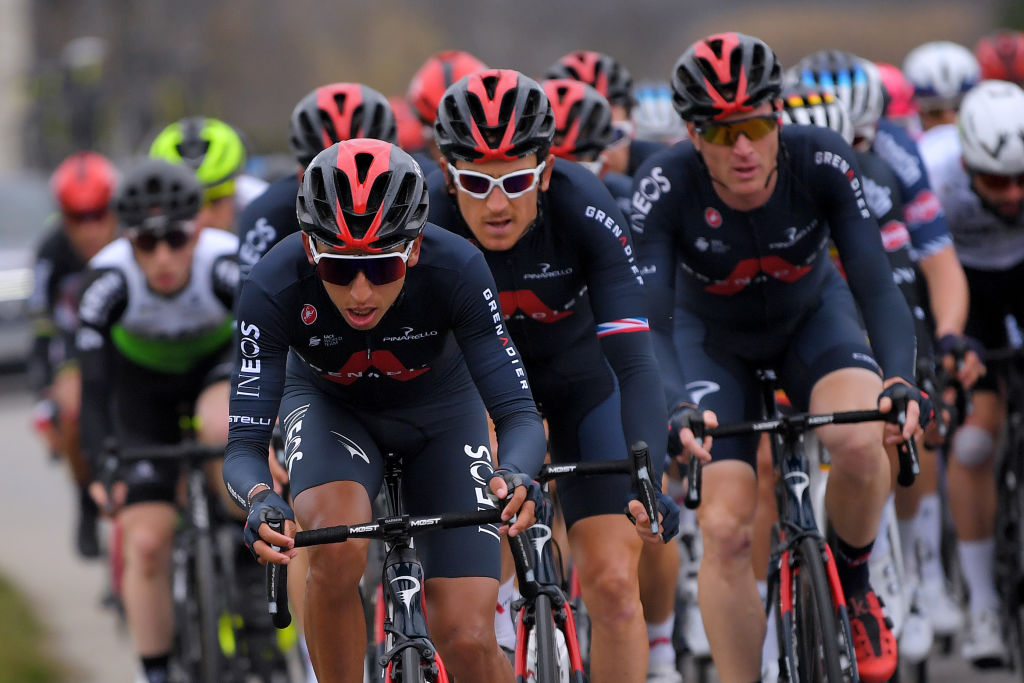Ineos Grenadiers' new strategic approach pays dividends at Étoile de Bessèges
Being aggressive may have cost Ineos GC but has allowed them to race says DS Servais Knaven

Earlier this week, Ineos Grenadiers boss Dave Brailsford explained that his team would be committed to "a more racing style" going forward, embracing a strategic approach intended to "rekindle everything about the joy of racing" as the squad announced their 2021 Grand Tour plans.
Over the course of the week, Ineos' performance at the Étoile de Bessèges has highlighted this new style, and particularly the two toughest road stages on days three and four, the second of those culminating with Filippo Ganna's storming solo ride to victory.
"We used to race with a little more control. Maybe in the past for a race like this we would simply have gone with Ganna as the leader because he's the best time trialist," Ineos directeur sportif Servais Knaven explained to Cyclingnews before the start of the race-concluding time trial in Alès, for which Ganna was the hottest of favourites.
"We'd just have kept him in the best position and tried not to let any breaks go and then he'd finish it off in the time trial."
Yet, as Brailsford said and Knaven confirmed, fundamentally professional racers want to do precisely that – to race – and the new focus on trying to create opportunities and upset established scenarios enables them to do that.
"The riders are really happy with it and we are happy too. It's good to see that it works, and even if it doesn't work we're bike racers who want to race," said Knaven.
"You learn that as a kid, as a junior, as an under-23. It's in the genes. Every rider who is the professional peloton has raced a lot and racing in this way opens up more opportunities for them."
Get The Leadout Newsletter
The latest race content, interviews, features, reviews and expert buying guides, direct to your inbox!
The Dutch DS acknowledged that being proactive and aggressive rather than controlling may well have cost Ineos the GC at Bessèges. But he insisted that this was a price worth paying on occasion.
"It may well be that the consequence of this strategy is that Ganna isn't in the GC contest any more, because we chose a different tactic," said Knaven. "But, at the same time, it's also gives him the opportunity to win a stage. We had Michał Kwiatkowski and Egan Bernal in the break the other day, and that gave Kwiato the possibility of winning the GC."
Knaven described Bessèges as being a good week overall for the team, with some top results and a stage win even if Kwiatkowski heads into the final time trial fighting for a podium spot rather than the overall win.
"The first two days there wasn't really a good opportunity to go in the breakaway. We tried a bit with Kwiato on stage 1 and he finished fifth, then we had Ethan Hayter for stage 2 and he crashed with a few k's to go. But the last two days have been great.
"Kwiato was a bit unlucky there when he missed the corner because there was oil on the road [when he was in the winning break on day three], because he could maybe have tried to win the stage. And yesterday was brilliant. I don't think anyone expected Filippo to win when the gap was only 20 seconds with only 20k to go. He's so strong. His engine is so big and he's getting better and better. You can see that in the time trials, but also with that stage he won in the Giro d'Italia last year."
Knaven cautioned, though, that this tactic won't be employed at every event on the calendar. Despite the unusually strong field at the race, WorldTour events will throw up even tougher opponents.
"It can work in these races, but in Paris-Nice and Tirreno it's very different because there's more depth to the field," he explained. "Also, this isn't the hardest race of the season when you look at the course, so here you can try out different tactics and give more riders the chance to win the race.
"But if you send someone to the front in Paris-Nice or Tirreno, you could end up compromising your GC chances, and you don't want to compromise too much. It's all about finding the right balance."
The Dutchman spent a good part of his racing career within the Deceuninck-QuickStep setup, and he pointed to them as a team that have long employed this opportunistic approach to racing, but added that the Belgian team has also had to back off from it on occasions.
"They've raced for years like this. But look at the Giro last year, where they took the jersey and didn't end up winning any stages," he said. "Like I said, it's all about getting the balance right, and I think we've done that very well here this week."
Peter Cossins has written about professional cycling since 1993 and is a contributing editor to Procycling. He is the author of The Monuments: The Grit and the Glory of Cycling's Greatest One-Day Races (Bloomsbury, March 2014) and has translated Christophe Bassons' autobiography, A Clean Break (Bloomsbury, July 2014).